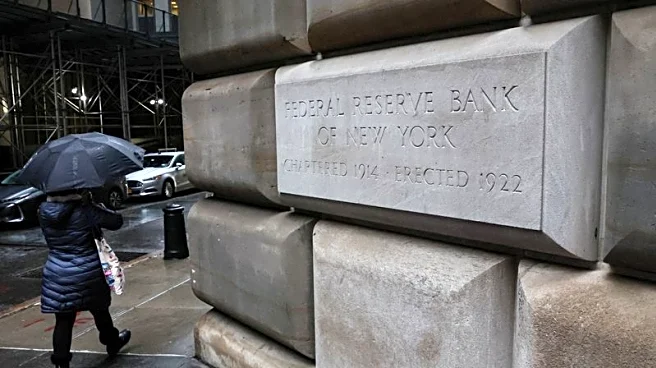What's Happening?
Goldman Sachs has issued a warning that the price of gold could reach $5,000 per troy ounce if President Trump continues to interfere with the Federal Reserve's independence. Currently, gold is priced at $3,596 on the Comex exchange, marking a 36% increase year-to-date. The White House is reportedly seeking to place more politically aligned individuals on the Federal Open Market Committee, with President Trump and his allies calling for investigations into Federal Reserve Chairman Jerome Powell and Fed Governor Lisa Cook. This interference has led to concerns about the Fed's independence, prompting investors to consider gold as a safe-haven asset. Goldman Sachs analyst Samantha Dart highlighted that a compromised Fed independence could result in higher inflation, increased long-term interest rates, lower bond prices, and a weakened U.S. dollar, making gold a more attractive investment.
Why It's Important?
The potential erosion of the Federal Reserve's independence could have significant implications for the U.S. economy. If investors lose confidence in the Fed's ability to manage monetary policy without political interference, it could lead to increased market volatility and a shift towards safe-haven assets like gold. This scenario could result in higher inflation and interest rates, negatively impacting bond and stock markets. Additionally, the U.S. dollar's status as a reserve currency could be threatened, affecting international trade and economic stability. The situation underscores the importance of maintaining the Fed's independence to ensure effective economic governance and investor confidence.
What's Next?
The Federal Reserve is expected to announce a base interest rate cut in September, with a nearly 98% probability according to CME's FedWatch tool. The extent and timing of future rate cuts remain uncertain, with differing opinions among Wall Street analysts. Fed officials, including Atlanta Fed President Raphael Bostic and Minneapolis Fed President Neel Kashkari, have expressed concerns about rising inflation and its impact on the Fed's dual mandate. The upcoming nonfarm payroll report and private payroll numbers from ADP will provide further insights into the labor market, influencing the Fed's decision-making process.
Beyond the Headlines
The ongoing tension between President Trump and the Federal Reserve highlights broader issues of political influence over economic institutions. The potential for compromised Fed independence raises ethical and governance concerns, as it could undermine the credibility of U.S. monetary policy. This situation may prompt discussions on the need for safeguards to protect the Fed's autonomy and ensure that economic decisions are made based on data and expertise rather than political agendas.











